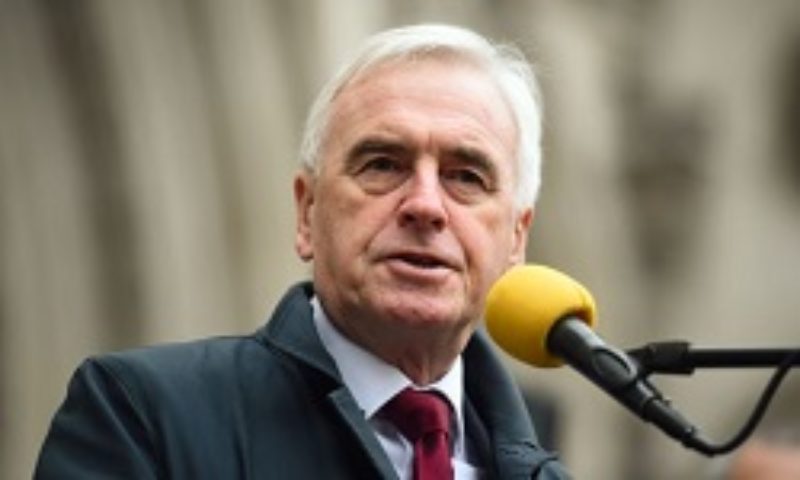John McDonnell MP

Guardian, Sunday 7 Oct 2018, Dan Sabbagh
John McDonnell has called for universal credit to be scrapped and accused Theresa May of falsely declaring an end to austerity amid reports that millions of families could lose up £200 a month when the new benefit is rolled out nationally.
The shadow chancellor hit back at the prime minister, who had claimed in a newspaper article that “the end is in sight” for the squeeze on public sector spending. McDonnell warned that the benefits system was no longer providing a proper safety net.
Hardening the party’s position on the universal credit, McDonnell said in a television interview: “We’ve looked and looked, we can’t see that either government’s or other proposals could reform it. It’s in a shambles, and it’s actually iniquitous as well.”
According to leaks over the weekend, Esther McVey, the work and pensions secretary, recently briefed cabinet colleagues that half of single parents and about two-thirds of working-age couples with children would lose the equivalent of £2,400 a year.
That, McDonnell said, justified abolition. “Isn’t it ironic that we discover members of the cabinet are being briefed families are losing out £200 a month as a result of the rollout of universal credit?” he said, telling Sky News “there’s no end of austerity – quite the reverse”.
McDonnell said that Labour was exploring the impact of automation in the economy and told the BBC that the party would “look at the working week” as part of a review of the issue.
When asked if that meant the party would consider looking at promising a “four-day week” in its manifesto for the next election the shadow chancellor said he would “see how it goes”, prompting speculation that the idea was being considered.
May had used her party conference speech last Wednesday to try to woo Labour votes with a hint that austerity would come to an end in the next public sector spending round between 2020 and 2023, although with the country’s post-Brexit economic prospects so unclear, it was not certain how the government would pay for it.
In response to May’s claims, Labour released a cluster of evidence that it said showed austerity was far from over, including an analysis published in March this year by the Institute of Fiscal Studies that showed that 75% of the welfare cuts announced since July 2015 had yet to take effect.
“Labour is the new mainstream, we are winning the public debate and our policies represent the centre ground of public opinion, which is why Theresa May wants to make it seem she’s adopting them,” a party spokesman added.
Regarding reports that many families would be £200 a month worse off, the Department for Work and Pensions said it did not comment “on alleged leaks”. When asked about the subject, the Conservative party chairman, Brandon Lewis, did not deny the reports: “As you move on to universal credit, the system looks at the individual and comes up with an approach to somebody’s needs,” the cabinet minister told BBC’s The Andrew Marr Show.
Lewis said universal credit had been rolled out “very slowly and very methodically” – including in his Great Yarmouth constituency – and sought to defend some of its principles, saying it was “getting more people into work in a sustainable way”.
Labour has been edging toward advocating the abolition of universal credit, a complex system that merges six existing benefits into a single payment. At the party’s conference in Liverpool last month, McDonnell indicated that a review was likely to conclude that replacement, not reform, was the answer.
Lewis also hit back at McDonnell, challenging Labour to say how it would reform the benefits system, and noting that the shadow chancellor had advocated simplification of the sort intended by universal credit. “Of course he’s not able to outline what he would do exactly,” the Conservative chairman said.
Earlier, McDonnell had said a “root and branch examination of how we can go forward” was required and “the principle of bringing together benefits in one so it’s a much simpler system is something we all support, but this hasn’t done that”.
Sir Richard Dearlove, the head of MI6 between 1999 and 2004, had earlier told Sky News that he was concerned about Jeremy Corbyn.
“Someone coming from my background is troubled by Jeremy Corbyn’s past associations, some of which I find surprising and worrying. He may have abandoned them now, but I don’t think you can entirely, as it were, dump your past,” he said.
“He’s enthusiastically associated himself with groups and interests which I would not say were friends of the British nation.”
McDonnell sharply dismissed Dearlove’s comments and described him as “a reactionary member of the establishment”.
“Can I just say to him directly, I think he should spend his retirement in quiet contemplation of the role that he played with regard to the Iraq war, where over half a million people at least were killed,” he said.
“He was strongly criticised as the head of an organisation whose intelligence took us into that war, so I think he should have a bit of humility about the judgments he makes about individuals and others in the future.”
